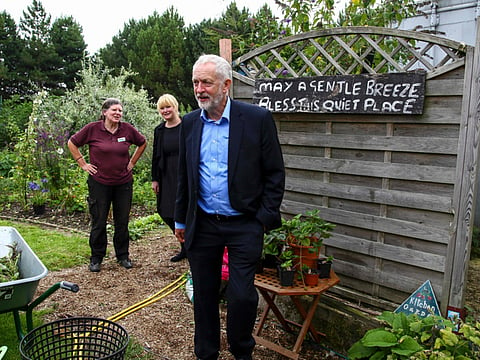Why does the Left always get a free pass?
Socialists are living in denial as they grapple with the difficult truth that their ideology always ends with a knock in the night

Venezuela’s agony is provoking spectacular gymnastics from British leftists. While the oil price was high enough to cushion that country from the effects of a command economy, Labour hardliners held it up as a workers’ paradise. Now, though, Venezuela has toppled into the abyss: inflation is at 800 per cent, food and medical supplies have run out, blackouts are frequent and the government has awarded itself dictatorial powers.
How have Corbynistas responded? First, they tried denial. The protests were got up by CIA-funded agents provocateurs, they told us. The empty shops were the work of saboteurs. If Hugo Chavez made a mistake, Ken Livingstone said, it was that “he didn’t kill all the oligarchs”. As the situation deteriorated, denial gave way to displacement. Suddenly, Chavez and his successor, Nicolas Maduro, had never been proper socialists at all. Why, asked Momentum agitators, did Right-wingers keep banging on about Venezuela instead of, say, the NHS? Come off it, comrades: few Britons could place Venezuela on a map before you started lecturing us all about how it was the model to follow. Now the line has altered again. Led by the columnist Owen Jones, radical leftists are shifting from displacement to hectoring.
Listen, by contrast, to Labour’s hard left on Venezuela. Seumas Milne, now Corbyn’s press spokesman, wrote that “Venezuela has demonstrated that it’s no longer necessary to accept a failed economic model.” Len McCluskey told us that “Europe might want to learn the obvious lessons from Venezuela”. Diane Abbott called Venezuela “another way”. Jeremy Corbyn himself, speaking at the Venezuela Solidarity Campaign as late as 2015, said: “There is an alternative to austerity and cuts, and enriching the richest and impoverishing the poorest, and it is called socialism.” Indeed it is. All the thrashing around is an attempt to avoid grappling with that hard truth. Venezuela is not semi-socialist or quasi-socialist. It has gone the whole hog, totus porcus. Chavez promised to govern for the many not the few, increased taxes and spending, nationalised private enterprise. Result? The same as always: shortages, hunger and, eventually, the use of state-run distribution centres to reward party members and punish political opponents. There is something almost heroic about the refusal of Britain’s hard left to infer anything from actual results.
The routine is always the same. Revolutionaries seize power somewhere and are hailed in Islington as heroes until their regime leads (as socialist regimes invariably lead) to squalor and repression, at which point they were never “real” socialists in the first place. The historian Giles Udy has just published a book on Labour’s early infatuation with the Soviet Union. George Lansbury, Labour’s Corbynesque leader in the early Thirties, had visited the USSR and come back with stories of progress and plenty. The pattern was repeated again and again. Romania, Yugoslavia, Cuba, Nicaragua — all had their British admirers, right up to the moments of their collapse. How are we to explain it, this determined attachment to a system that has failed every time — every time — it has been tried?
For some, it is the elevation, to a preposterous degree, of motive over outcome. Never mind that poverty in Venezuela has risen from 48 to 82 per cent, that the minimum wage has fallen in value by three quarters, that infant mortality is up a hundredfold. Everyone knows that socialists care about the underprivileged! For others, socialism’s appeal lies precisely in its unattainability. In every age and nation, some people are in the market for creeds that promise a new dawn, making no concession to past tradition or to human frailty. In this regard, if in no other, extreme socialists resemble hardline Islamists. They are happy to crack a few eggs in order to make the omelette. Still others are prepared to ally with any cause, however oppressive, provided it is sufficiently anti-western. I fear that Corbyn is in this category. The Venezuela Solidarity Campaign, of which he was the animating spirit, was anti-American before it was pro-Venezuelan. Even now, diehard British Chavistas make ludicrous comparisons with our own society (“Starvation in Caracas? There are food banks in Cardiff!”) While no country is perfect, we can say on the basis of empirical data that open markets make people freer, wealthier and happier than socialism.
There have been some laboratory-standard experiments: West Germany versus East Germany, South Korea versus North Korea. Yet there is a mulish tendency to judge capitalism by its necessarily imperfect real-world outcomes, while judging socialism as a textbook theory that has never been properly implemented. To see quite how absurd this is, imagine someone saying: “Fascism is a wonderful idea: you mustn’t confuse it with the dictatorial regimes in the Thirties that falsely called themselves fascist.”
Socialism always follows the same trajectory. It begins with slogans about The People; it ends with the knock in the night. Force is not incidental to a state-run economy; it is intrinsic. And all for what? Look at any example in the world, from Cuba to Czechoslovakia, from Venezuela to Vietnam. The eggs are smashed; but the omelette never emerges.
—The Telegraph Group Limited, London 2017
Daniel Hannan is a writer, journalist and British Conservative politician



